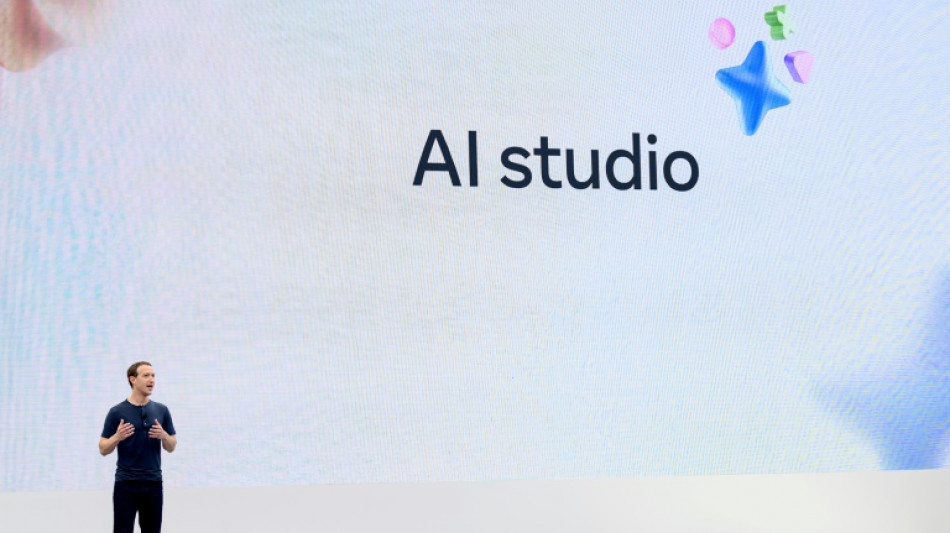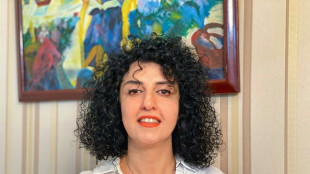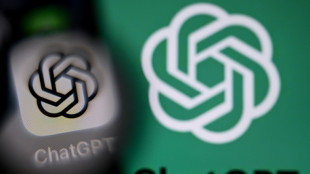
-
 Rob Reiner murder: son not medically cleared for court
Rob Reiner murder: son not medically cleared for court
-
FIFA announces $60 World Cup tickets for 'loyal fans'

-
 Dembele and Bonmati scoop FIFA Best awards
Dembele and Bonmati scoop FIFA Best awards
-
Shiffrin dominates first run in Courchevel slalom

-
 EU weakens 2035 combustion-engine ban to boost car industry
EU weakens 2035 combustion-engine ban to boost car industry
-
Arctic sees unprecedented heat as climate impacts cascade

-
 French lawmakers adopt social security budget, suspend pension reform
French lawmakers adopt social security budget, suspend pension reform
-
Afrikaners mark pilgrimage day, resonating with their US backers

-
 Lawmakers grill Trump officials on US alleged drug boat strikes
Lawmakers grill Trump officials on US alleged drug boat strikes
-
Hamraoui loses case against PSG over lack of support after attack

-
 Trump - a year of ruling by executive order
Trump - a year of ruling by executive order
-
Iran refusing to allow independent medical examination of Nobel winner: family

-
 Brazil megacity Sao Paulo struck by fresh water crisis
Brazil megacity Sao Paulo struck by fresh water crisis
-
Australia's Green becomes most expensive overseas buy in IPL history

-
 VW stops production at German site for first time
VW stops production at German site for first time
-
Man City star Doku sidelined until new year

-
 Rome's new Colosseum station reveals ancient treasures
Rome's new Colosseum station reveals ancient treasures
-
EU eases 2035 combustion-engine ban to boost car industry

-
 'Immense' collection of dinosaur footprints found in Italy
'Immense' collection of dinosaur footprints found in Italy
-
US unemployment rises further, hovering at highest since 2021

-
 Senators grill Trump officials on US alleged drug boat strikes
Senators grill Trump officials on US alleged drug boat strikes
-
Filmmaker Rob Reiner's son to be formally charged with parents' murder

-
 Shift in battle to tackle teens trapped in Marseille drug 'slavery'
Shift in battle to tackle teens trapped in Marseille drug 'slavery'
-
Stocks retreat on US jobs, oil drops on Ukraine hopes

-
 Manchester United 'wanted me to leave', claims Fernandes
Manchester United 'wanted me to leave', claims Fernandes
-
Serbian President blames 'witch hunt' for ditched Kushner hotel plan

-
 Man who hit Liverpool parade jailed for over 21 years
Man who hit Liverpool parade jailed for over 21 years
-
Sahel juntas would have welcomed a coup in Benin: analysts

-
 PSG ordered to pay around 60mn euros to Mbappe in wage dispute
PSG ordered to pay around 60mn euros to Mbappe in wage dispute
-
BBC says will fight Trump's $10 bn defamation lawsuit

-
 Stocks retreat ahead of US jobs, oil drops on Ukraine hopes
Stocks retreat ahead of US jobs, oil drops on Ukraine hopes
-
Suicide bomber kills five soldiers in northeast Nigeria: sources

-
 EU set to drop 2035 combustion-engine ban to boost car industry
EU set to drop 2035 combustion-engine ban to boost car industry
-
Australia's Green sold for record 252 mn rupees in IPL auction

-
 Elusive December sun leaves Stockholm in the dark
Elusive December sun leaves Stockholm in the dark
-
Brendan Rodgers joins Saudi club Al Qadsiah

-
 Thailand says Cambodia must announce ceasefire 'first' to stop fighting
Thailand says Cambodia must announce ceasefire 'first' to stop fighting
-
M23 militia says to pull out of key DR Congo city at US's request

-
 Thousands of glaciers to melt each year by mid-century: study
Thousands of glaciers to melt each year by mid-century: study
-
China to impose anti-dumping duties on EU pork for five years

-
 Nepal starts tiger census to track recovery
Nepal starts tiger census to track recovery
-
Economic losses from natural disasters down by a third in 2025: Swiss Re

-
 Indonesians reeling from flood devastation plea for global help
Indonesians reeling from flood devastation plea for global help
-
Timeline: How the Bondi Beach mass shooting unfolded

-
 On the campaign trail in a tug-of-war Myanmar town
On the campaign trail in a tug-of-war Myanmar town
-
Bondi Beach suspect visited Philippines on Indian passport

-
 Kenyan girls still afflicted by genital mutilation years after ban
Kenyan girls still afflicted by genital mutilation years after ban
-
Djokovic to warm up for Australian Open in Adelaide

-
 Man bailed for fire protest on track at Hong Kong's richest horse race
Man bailed for fire protest on track at Hong Kong's richest horse race
-
Men's ATP tennis to apply extreme heat rule from 2026


Mark Zuckerberg, AI's 'open source' evangelist
Mark Zuckerberg, the founder of Facebook and CEO of Meta, has become an unexpected evangelist for open source technology when it comes to developing artificial intelligence, pitting him against OpenAI and Google.
The 40-year-old tech tycoon laid out his vision in an open letter titled "Open Source AI is the Path Forward" this week. Here is what you need to know about the open versus closed model AI debate.
What is 'open source'?
The history of computer technology has long pitted open source aficionados against companies clinging to their intellectual property.
"Open source" refers to software development where the program code is made freely available to the public, allowing developers to tinker and build on it as they wish.
Many of the internet's foundational technologies, such as the Linux operating system and the Apache web server, are products of open source development.
However, open source is not without challenges. Maintaining large projects, ensuring consistent quality, and managing a wide range of contributors can be complex.
Finally, almost by definition, keeping open source projects financially sustainable is a challenge.
Why is Meta AI 'open source'?
Zuckerberg is probably the last person you would expect to embrace open source.
The company maintains total control over its Instagram and Facebook platforms, leaving little to no leeway for outside developers or researchers to tinker around.
The Cambridge Analytica scandal, in which an outside vendor was revealed in 2018 to be using the platform to gather user information for nefarious practices, only made the company more protective.
Meta's sudden embrace of the open source ethos is driven by its bitterness towards Apple, whose iPhone rules keep a tight control on what Meta and all outside apps can do on their devices.
"One of my formative experiences has been building our services constrained by what Apple will let us build on their platforms," Zuckerberg said.
“Between the way they tax developers, the arbitrary rules they apply, and all the product innovations they block from shipping, it's clear that Meta and many other companies would be freed up if...competitors were not able to constrain what we could build,” he wrote.
That concern has now spread to generative AI, but this time it is Microsoft-backed OpenAI and Google that are the closed-fence culprits that charge developers and keep a tight lid on their AI technology.
Doubters argue that Meta is embracing open source because it came late to the AI party, and is seeking to blow open the field with free access to a powerful model.
- What is Llama? -
Meta's open source LLaMA 3.1 (for Large Language Model Meta AI) is the company’s latest version of its generative AI technology that can spew out human standard content in just seconds.
Performance-wise, it can be compared to OpenAI’s GPT-4 or Google’s Gemini, and like those models is "trained" before deployment by ingesting data from the internet.
But unlike those models, developers can access the technology for free, and make adaptations as they see fit for their specific use cases.
Meta says that LLaMA 3.1 is as good as the best models out there, but unlike its main rivals, it only deals with text, with the company saying it will later match the others with images, audio and video.
- Security threat -
In the rivalry over generative AI, defenders of the closed model argue that the Meta way is dangerous, as it allows bad actors to weaponize the powerful technology.
In Washington, lobbyists argue over the distinction, with opponents to open source insisting that models like Llama can be weaponized by countries like China.
Meta argues that transparency assures a more level playing field and that a world of closed models will ensure that only a few big companies, and a powerhouse nation like China, will be in control.
Startups, universities, and small businesses will "miss out on opportunities," Zuckerberg said.
A.Jones--AMWN



